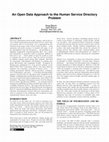Papers by Gregory Bloom
Provisional Research, Dec 2013
The ‘City as a Commons’—the idea of urban commoning—is an emerging body of ideas and practices, t... more The ‘City as a Commons’—the idea of urban commoning—is an emerging body of ideas and practices, that have the potential to transform the ways in which we experience and shape our urban environments, and indeed world.
I submitted a short paper to this compilation assembled by José Maria Ramos.

Directory information about health, human, and social ser- vices (which organizations provide wha... more Directory information about health, human, and social ser- vices (which organizations provide what services, where they are located, how to access them, etc) is aggregated by dis- tributed actors using a wide variety of data systems — from enterprise call-center systems, to modern web apps, to ad hoc spreadsheets and text documents — all operating in re- dundant, fragmented, non-interoperable silos. As a result, this information is generally costly to maintain, difficult to find and to use — which makes it hard for people in need to navigate the service sectors, hard for service providers to address complex needs among their clientele, and hard for researchers, policymakers and funders to evaluate pro- gram effectiveness and community health. Prompted by Schema.org’s submission of a ‘civic services schema’ to the World Wide Web Consortium (W3C), the Open Referral Initiative has convened a network of diverse actors — in- cluding government officials, referral providers, academics, civic technologists, and more — to develop interoperability among a) systems that use the legacy data standards of the Alliance of Information and Referral Systems, b) an emerg- ing class of web-based referral applications, and c) W3C web standards. This paper will present version 1.0 of the Human Services Data Specification (HSDS) — an exchange format designed for publishing machine-readable data about the ac- cessibility of human services. The paper will also describe a proposal for the next phase of Open Referral’s development: that of a federated publishing platform that can enable dis- tributed, heterogeneous resource directory information sys- tems to cooperate in the validation and circulation of open, standardized resource data over time.
Civic technology [is] that which helps citizens work together, particularly in the building of a ... more Civic technology [is] that which helps citizens work together, particularly in the building of a world in which all people can live with dignity and respect.... The work of civic design begins precisely where the logic of 'government as platform' ends, averting the many possible (yet not inevitable) tragedies that might befall the commons. In my work as a civic technologist, I strive to apply a set of principles that I’ve come to call 'community as platform.'
Bread for the City is one of Washington D.C.'s largest and most comprehensive providers of human ... more Bread for the City is one of Washington D.C.'s largest and most comprehensive providers of human services: an institution nearly four decades old, with four departments offering dozens of services-health care, legal counsel, food provisions, social workers, and the "Bread Boutique" clothing room to boot-in two facilities on opposite sides of the city. About thirty-two thousand people walk through Bread for the City's doors each year, but out of all of these "walk-ins," only around twelve thousand people actually become "clients." The rest may need services that are provided elsewhere, at other non-profits or public agencies, and Bread for the City's social workers redirect them accordingly.
Working papers by Gregory Bloom

Uploads
Papers by Gregory Bloom
I submitted a short paper to this compilation assembled by José Maria Ramos.
Working papers by Gregory Bloom
I submitted a short paper to this compilation assembled by José Maria Ramos.